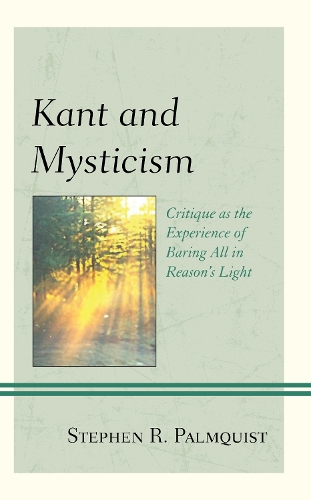
Kant and Mysticism: Critique as the Experience of Baring All in Reason's Light
(Paperback)
Available Formats
Publishing Details
Kant and Mysticism: Critique as the Experience of Baring All in Reason's Light
By (Author) Stephen R. Palmquist
Bloomsbury Publishing PLC
Lexington Books
8th March 2022
United States
Classifications
Professional and Scholarly
Non Fiction
Mysticism
Philosophy
193
Physical Properties
Paperback
192
Width 154mm, Height 230mm, Spine 14mm
281g
Description
What is happening when someone has a mystical experience, such as feeling at one with the universe or hearing Gods voice Does philosophy provide tools for assessing such claims Which claims can be dismissed as delusions and which ones convey genuine truths that might be universally meaningful Valuable insights into such pressing questions can be found in the writings of Immanuel Kant, though few philosophical commentators have appreciated the implications beyond his famous Copernican hypothesis. In Kant and Mysticism, Stephen R. Palmquist corrects this skewed view of Kant once and for all.
Beginning with a detailed analysis of Kants 1766 work Dreams of a Spirit-Seer, Palmquist demonstrates that in Dreams Kant first discovers and explains his plan to write a new, critical philosophy that will revolutionize metaphysics by laying bare the limits of human reason. Palmquist shows how the same metaphorical relationshipbetween reasons dreams (metaphysics) and sensibilitys dreams (mysticism)permeates Kants mature writings. Clarifying how Kants final (unfinished) book, Opus Postumum, completes this dual project, Palmquist explains how the critical mysticism entailed by Kants position has profound implications for contemporary understandings of religious and mystical experience, both by religious individuals and by philosophers seeking to understand such experiences.
Reviews
Palmquist is to be applauded for his willingness to challenge conventional accounts of the development of Kants Critical philosophy and broaden the scope of Kant interpretation in this and other works. - J. Colin McQuillan, St. Marys University
Kant and Mysticism lucidly unfolds a significant alternative to the standard interpretations of Dreams [of a Spirit-Seer] and, more generally, mysticism in Kants philosophy. It is an eloquent and nuanced reading of the conceptual development of Kants Critical philosophy in its historical context and Kants thinking of problems of experience, intuition and the religious that will become an essential reference for future scholarship. - Eric S. Nelson, Hong Kong University of Science and Technology
The whole book is a bold attempt to overturn and dismantle the standard interpretation (namely, that Kant is primarily an empirical philosopher, the all-destroyer of metaphysics and a reducer of religion to morality) and its frown on any form of mysticism in Kant whatsoever. - Prof. Chris L. Firestone, Trinity International University
* Kantian Review *Kant and Mysticismdoes a good job of capturing what is mystical in Kant, pushing some key Kantian themes toward the mystical while seemingly preserving their spirit. . . . Palmquist thus helps us to see a Kant whose concern with the limits of knowledge goes beyond developing a metaphysics, and whose concern with religion goes beyond grafting doctrines onto morality. . . . Palmquists work deserves praise and attention for drawing together underutilized parts of Kants work in an illuminating way.
* Review of Metaphysics *Kants Dreams of a Spirit-Seer, his early sardonic critique of the Swedish mystic Emanuel Swedenborg, is often taken as an odd and unimportant episode in the development of Kants critical philosophy. But Stephen R. Palmquist convincingly shows that Kant was significantly influenced by Swedenborgs writings, borrowing elements of epistemology, ethics, and religious thinking from Swedenborg. Palmquists work also profoundly deepens our understanding of the extent to which a mysticism of reason lies at the heart of Kants whole critical philosophy. -- Ronald M. Green, Dartmouth College
The term "mysticism" is generally regarded as having negative connotations for Kant. Thus, for example, references to Kants interest in K.A. Wilmans dissertation on this topic are often one-sided. Consequently, works clarifying Kants actual relation to mysticism are most welcome. In view of the widespread disregard for Kants central questions, this new book is of the highest importance, especially its last chapter, on the mystical implications of Kants Opus Postumum. -- Norbert Fischer, Katholische Universitt Eichsttt-Ingolstadt
Palmquist's holistic and perspectival interpretation offers a provocative way to rethink Kant's arguments and their implications. -- Eric S. Nelson, Hong Kong University of Science and Technology
Author Bio
Stephen R. Palmquist is professor of religion and philosophy at Hong Kong Baptist University.
